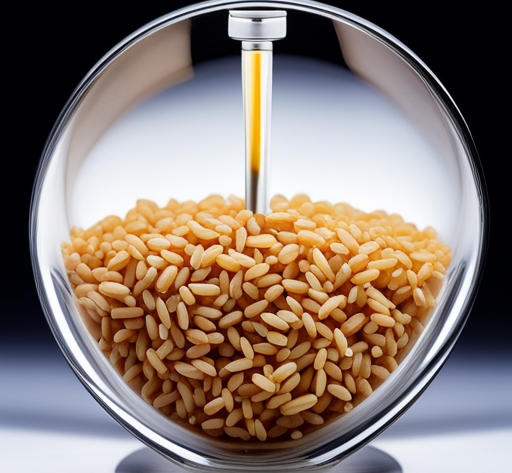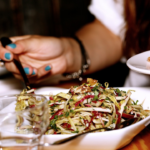Do you ever wonder if it’s safe to eat uncooked rice? Like a cautious traveler navigating unfamiliar terrain, you seek answers to protect your health.
In this article, we will delve into the potential risks of consuming uncooked rice, including bacterial contamination and foodborne illnesses.
We will explore the nutritional value of uncooked rice and discuss cooking methods to eliminate these risks.
By the end, you will have expert opinions to make an informed decision about the safety of uncooked rice.
Key Takeaways
- Uncooked rice can have higher levels of arsenic and can lead to potential digestive issues.
- Uncooked rice may contain harmful bacteria like Bacillus cereus and Salmonella, which can cause foodborne illnesses.
- Cooking rice at high temperatures can kill harmful bacteria and make it safer to consume.
- Uncooked rice retains higher levels of fiber, B vitamins, and iron, but cooking is necessary for safety.
Potential Risks of Eating Uncooked Rice
You should definitely be aware of the potential risks of eating uncooked rice. There are two main risks associated with consuming uncooked rice: the risk of arsenic exposure and potential digestive issues.
Arsenic is a naturally occurring element that can be found in rice, especially in brown rice. When rice is cooked, the levels of arsenic decrease significantly. However, when consumed uncooked, there’s a higher chance of ingesting higher levels of arsenic, which can have detrimental effects on your health.
Additionally, uncooked rice can be harder to digest, leading to bloating, gas, and even stomach discomfort. Cooking rice thoroughly helps break down the starches, making it easier for your digestive system to process.
Therefore, it’s important to consider these potential risks before consuming uncooked rice.
Bacterial Contamination and Foodborne Illnesses
Bacterial contamination can pose a serious risk when consuming uncooked rice. Raw rice may contain harmful bacteria such as Bacillus cereus and Salmonella, which can cause foodborne illnesses.
These bacteria can multiply rapidly when rice is left at room temperature, leading to bacterial growth and the production of toxins. Cooking rice at high temperatures can kill these bacteria and make the rice safe to eat.
The optimal cooking temperature for rice is above 165°F (74°C) to ensure that all harmful bacteria are destroyed.
It’s important to cook rice thoroughly and avoid leaving it out at room temperature for extended periods to prevent bacterial contamination and potential foodborne illnesses.
Nutritional Value of Uncooked Rice
Furthermore, uncooked rice contains higher levels of certain nutrients compared to cooked rice. This is because the cooking process can cause some loss of nutrients in rice. Here are four key nutrients that are found in higher quantities in uncooked rice:
-
Fiber: Uncooked rice retains more fiber, which is important for promoting digestive health and preventing constipation.
-
B vitamins: Uncooked rice contains higher levels of B vitamins such as thiamin, niacin, and folate. These vitamins play a crucial role in energy production, metabolism, and the formation of red blood cells.
-
Iron: Uncooked rice is a better source of iron, an essential mineral that helps transport oxygen throughout the body and supports overall health.
-
Antioxidants: Certain rice varieties, especially those with colored bran, contain higher levels of antioxidants in their uncooked form. Antioxidants help protect the body against damage from harmful free radicals.
While cooking rice is necessary for it to be safely consumed, it’s worth noting that uncooked rice can offer some nutritional benefits. However, it’s important to choose the right cooking techniques and rice varieties to make the most of these nutrients.
Cooking Methods to Eliminate Risks
To ensure the safety of consuming rice, it is important to properly cook it using various methods. Cooking rice not only eliminates the potential risks of consuming uncooked rice, but it also enhances its nutritional value. Here are some rice cooking techniques that can help you enjoy the health benefits of cooked rice:
| Cooking Method | Description | Benefits |
|---|---|---|
| Boiling | Rice is cooked in a pot of boiling water | Retains most of the nutrients and is easy to prepare |
| Steaming | Rice is cooked using steam in a covered pot | Preserves the nutrients and gives a fluffy texture |
| Pressure cooking | Rice is cooked under high pressure and steam | Reduces cooking time and retains the nutritional content |
| Absorption method | Rice is cooked by absorbing all the water | Results in evenly cooked grains and enhances flavor |
| Rice cooker | Rice is cooked in an electric rice cooker | Convenient and ensures perfectly cooked rice every time |
Expert Opinions on Consuming Uncooked Rice
If you’re unsure about the safety of consuming uncooked rice, it’s important to consider the expert opinions on the matter. Here are four key points to help you understand the safety concerns and health implications associated with eating uncooked rice:
-
Bacterial contamination: Uncooked rice may contain spores of Bacillus cereus, a bacterium that can cause food poisoning. These spores can survive the cooking process and multiply if rice is left unrefrigerated.
-
Digestive issues: Consuming uncooked rice can lead to digestive problems such as bloating, gas, and diarrhea. This is because uncooked rice contains resistant starch, which is difficult for the body to break down.
-
Nutrient absorption: Cooking rice breaks down its starches, making it easier for the body to digest and absorb essential nutrients. Eating uncooked rice may hinder nutrient absorption and potentially lead to nutrient deficiencies.
-
Food safety guidelines: Most food safety organizations, such as the FDA and the Food Standards Agency, advise against eating uncooked rice due to the potential risks it poses.
Considering these expert opinions, it’s generally recommended to cook rice thoroughly before consuming it to ensure food safety and minimize health risks.
Frequently Asked Questions
How Long Can Uncooked Rice Be Stored Before It Becomes Unsafe to Consume?
Storing uncooked rice for a long time increases the risk of it becoming unsafe to eat. Consuming expired uncooked rice can lead to food poisoning. It’s important to be aware of the risks and properly store your rice.
Can Uncooked Rice Cause Food Poisoning if It Is Properly Washed Before Cooking?
Washing uncooked rice can prevent food poisoning. However, if not properly cooked, uncooked rice can still be harmful. Ensure thorough cooking to eliminate any potential risks and enjoy your meal safely.
Are There Any Specific Types of Rice That Are Safer to Consume Uncooked?
There are no specific types of rice that are safer to consume uncooked. While uncooked rice may have some nutritional value, it is primarily used for cooking and should be properly cooked to avoid any potential health risks.
Can Uncooked Rice Lead to Digestive Issues or Stomach Discomfort?
Eating uncooked rice can potentially cause digestive issues and stomach discomfort. It may also have a negative impact on your gut health. It’s important to cook rice thoroughly to avoid these potential health risks.
Is It Safe to Eat Uncooked Rice if It Is Soaked in Water or Another Liquid for a Certain Period of Time?
If you’re thinking about trying uncooked rice alternatives, it’s important to consider safety. While soaking uncooked rice in liquid can soften it, there’s still a risk of bacterial contamination.
Conclusion
In conclusion, it isn’t safe to eat uncooked rice due to the potential risks of bacterial contamination and foodborne illnesses. Cooking rice thoroughly is crucial in eliminating these risks and ensuring its nutritional value.
Expert opinions support the idea that consuming uncooked rice isn’t advisable. So, the next time you consider eating uncooked rice, ask yourself: is it worth risking your health?




